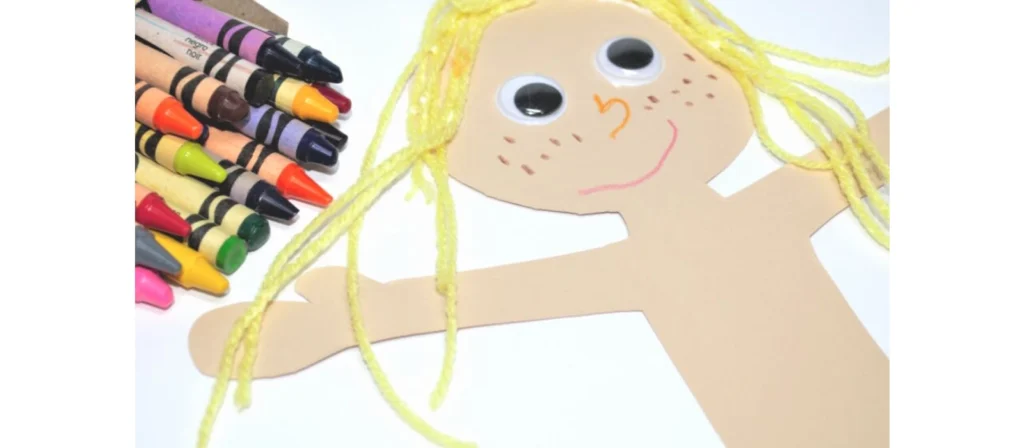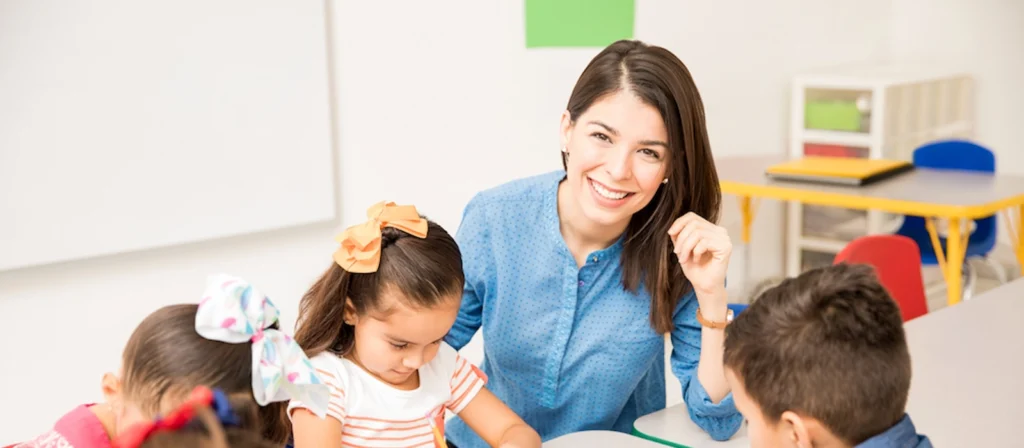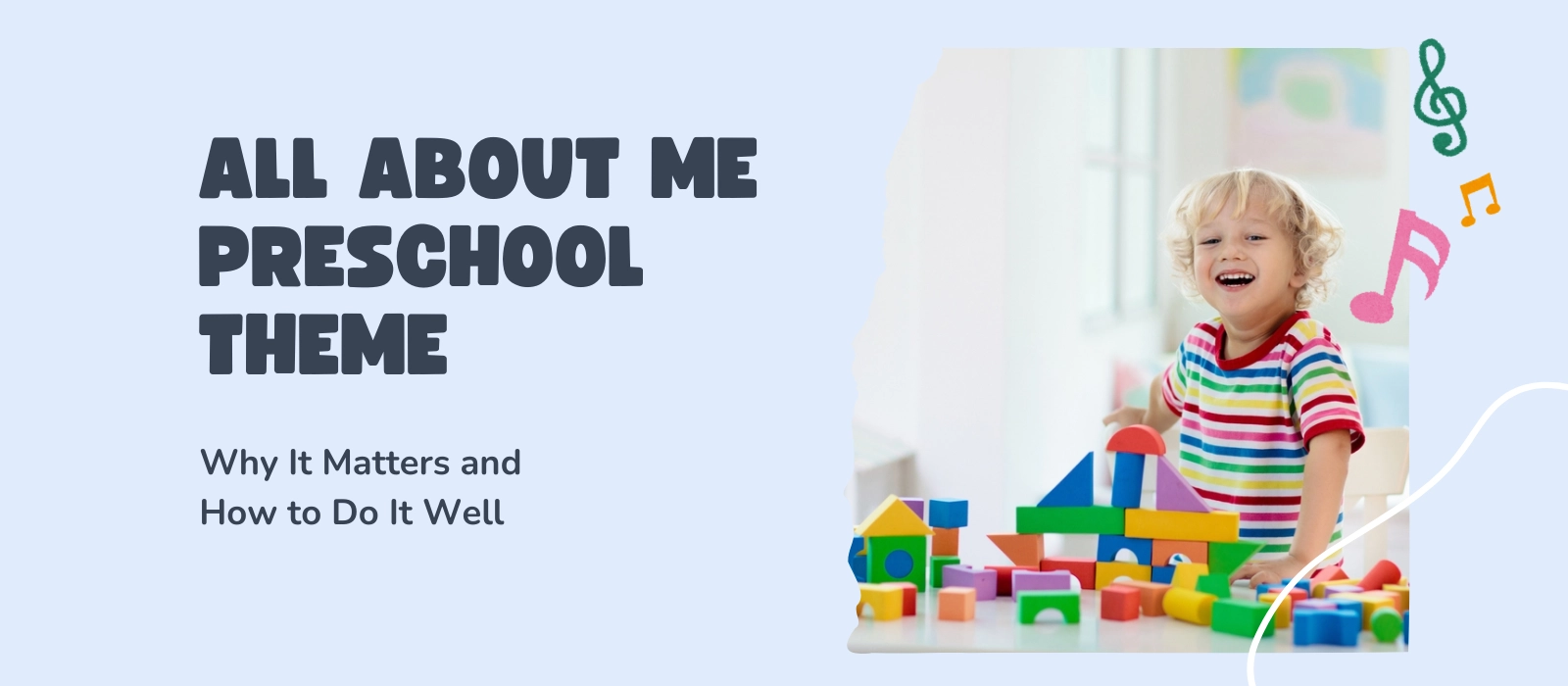Have you noticed how quickly children open up when learning starts with their own stories? The all about me preschool theme turns first-week jitters into joyful sharing—names, families, favorite foods, traditions. It’s more than cute portraits; it’s the emotional anchor that makes a new classroom feel safe.
In simple terms, the all about me preschool theme builds belonging first, then learning. By centering identity, children practice language, early literacy, math comparisons, and social-emotional skills. They see themselves in the space, connect with peers, and trust their teacher—foundations that make every later unit more successful.
Stick with me and I’ll show you how to plan activities, set up learning centers, and use parent partnerships to make this theme meaningful—not just memorable.
What Is an All About Me Preschool Theme?
The all about me preschool theme is an early childhood educational approach that focuses on helping children explore their identities, emotions, family backgrounds, and unique traits. It typically marks the beginning of the school year and is used as a foundational theme in preschools around the world. For many early childhood educators, the all about me preschool unit is the first real step into curriculum-based interaction with young learners.
A Theme Rooted in Identity and Discovery
This theme is designed to be flexible, fun, and deeply meaningful. Children are encouraged to talk about themselves, their families, their favorite things, and what makes them special. These concepts are then incorporated into a wide variety of hands-on activities including drawing, storytelling, singing, and even dramatic play. The all about me preschool theme gives young children the chance to see themselves reflected in their learning environment, which builds confidence and reinforces a sense of belonging.
A Tool for Teachers to Understand Each Child
More importantly, the all about me preschool theme helps teachers build critical early connections with their students. At the beginning of the year, educators are trying to learn who each child is—their interests, strengths, fears, and family circumstances. This theme naturally creates the space for those observations to occur, making it a valuable tool not just for teaching but for long-term classroom management and planning.
Cross-Curricular Learning Opportunities
In addition to social-emotional development, the all about me preschool theme can touch on early literacy (writing names, recognizing letters), math (how many people are in your family?), science (body parts), and even geography (where are you from?). It serves as a perfect integrative unit that works across subjects, skill levels, and age ranges.
Next, let’s explore why this theme is so critical for preschool success, and how to use it as more than just a fun opening week.

Why the All About Me Preschool Theme Matters So Much
Fostering Emotional Security from Day One
Children stepping into a preschool classroom for the first time often feel a mix of excitement and anxiety. The all about me preschool theme immediately provides a comforting routine that centers on what they already know—themselves. When children can talk about familiar things like their names, their families, and their favorite foods, it gives them a sense of control and comfort in a new environment. This emotional security is key to supporting healthy learning habits.
Building Early Peer Connections
One of the greatest benefits of the all about me preschool theme is how it naturally creates opportunities for peer bonding. As children share stories about their homes, pets, or traditions, they begin to discover common interests and differences with their classmates. These moments help foster empathy and connection at a very young age. Group activities tied to the theme also support cooperation and communication.
Guiding Teachers to Understand Each Learner
From a teacher’s perspective, the first few weeks of school are crucial for assessment and classroom relationship-building. The all about me preschool theme gives educators multiple chances to observe how each child behaves in a group, how they communicate, and where they need support. These early insights are essential for tailoring lesson plans and behavior strategies throughout the rest of the year.
Laying the Foundation for Lifelong Learning
The all about me preschool theme does more than help children feel included—it encourages them to be curious about others, to ask questions, and to reflect on their own identity. These are foundational social-emotional skills that will serve them far beyond the preschool years. In many ways, this theme sets the tone for a culture of respect, inclusion, and personal growth within the classroom.
In the next section, we’ll look at how to plan out this theme in practical terms—from choosing the right weekly activities to organizing your learning centers around the idea of self-discovery.
Teacher’s Role in the All About Me Preschool Theme
Setting the Tone for Emotional Safety
Teachers are the emotional anchors in any early childhood classroom, especially when launching the all about me preschool theme. Their warmth, attentiveness, and ability to listen create an atmosphere where children feel safe to share personal details about themselves. Establishing rituals such as morning greetings by name or reflection circles helps foster trust and emotional connection. These small gestures reinforce each child’s sense of identity and help build classroom unity from the very first week.

Guiding Conversations with Care and Respect
Much of the all about me preschool theme relies on children talking about themselves. This means teachers must gently encourage children to express their thoughts while ensuring everyone feels respected. Open-ended questions like “Who is in your family?” or “What makes you happy?” invite meaningful responses. At the same time, teachers must navigate sensitive topics—like nontraditional family structures or cultural differences—with empathy and inclusion.
Observing and Documenting Development
The theme gives educators a valuable window into each child’s communication style, emotional literacy, and social skills. Teachers can take notes during sharing activities or art sessions, using them as early assessment tools. These observations become useful not only for curriculum planning but also for parent meetings and individualized support. Teachers often use visual documentation such as portfolios, storyboards, or bulletin boards to showcase children’s evolving understanding of identity.
Encouraging Peer Learning and Empathy
A major goal of the all about me preschool theme is to help children recognize and respect both similarities and differences among their peers. Teachers facilitate this by promoting cooperative learning opportunities: partner interviews, group collages, and collaborative storytelling. By intentionally mixing small groups and prompting inclusive dialogue, educators help students form early bonds and develop empathy—an essential part of social-emotional development.
In the following section, we’ll take a look at how to involve parents in this theme to further strengthen the connection between home and school.
How to Adapt the All About Me Preschool Theme for Different Age Groups
Toddlers (Ages 2–3)
Children at this age are just beginning to understand the concept of “me” and “others.” Their world is driven by sensory experiences and attachment relationships, so learning through touch, sight, and sound is most effective. Activities should focus on sensory-rich experiences and basic recognition of faces, names, and body parts.
- Use large mirrors for facial exploration and name pointing.
- Sing name-based songs during transition times to build routine.
- Offer textured self-portrait materials like yarn, felt, and soft shapes that they can explore freely.
At this age, repetition and routine are key. Activities should be short, repetitive, and highly visual to support attention spans.
Preschoolers (Ages 3–4)
At this stage, children begin forming deeper relationships and can engage in guided storytelling and emotion-based activities. They start recognizing and labeling their own emotions and can talk about basic preferences.
- Introduce simple feelings charts and matching games with real child photos.
- Create family collages with minimal adult help using pre-cut shapes.
- Encourage basic verbal sharing about favorite foods, toys, or people through circle time prompts.
Children at this age enjoy games involving guessing, repetition, and memory. Integrating literacy concepts through name games or story dictation begins at this level.
Pre-Kindergarten (Ages 5–6)
Older children can dive into more complex identity themes like culture, language, and preferences. They are beginning to understand time, place, and social roles.
- Let them write or dictate short bios for All About Me books with sentences like “I live with…” or “I love to…”
- Include math links (e.g., how many people are in your house?) and map activities (where is your family from?).
- Guide them in presenting themselves to the class, building public speaking and listening skills.
These learners can also begin to analyze how others are similar and different. That cognitive leap makes the theme much richer at this level.
Mixed-Age Classrooms
Use layered activity stations so younger children can engage with visuals and textures, while older ones expand into writing, comparison, or storytelling. Multi-age classrooms benefit from peer modeling—older children can help younger ones with tasks, creating a cooperative environment.
- Set up a portrait table with crayons and mirrors for all ages
- Offer a writing station with name tracing and sentence starters for advanced learners
- Use storybooks that prompt responses at multiple developmental levels
Flexibility is key—teachers should prepare materials at multiple levels of complexity to keep all children engaged and successful.

How to Extend the All About Me Preschool Theme Across the Year
Reconnecting with Identity in New Contexts
Revisiting the all about me preschool theme across the year helps children deepen their self-awareness and social understanding. Revisiting these topics as children grow builds stronger emotional vocabulary and sense of belonging.
- In the fall, focus on families and homes—Who do I live with? Where do I sleep?
- In winter, link identity to holidays and personal traditions—What do we celebrate? What do we eat?
- In spring, highlight emotional growth and friendships—What makes a good friend? How have I changed?
These seasonal moments create natural checkpoints to reflect on identity growth.
Integrating the Theme with Other Units
The all about me preschool concept connects well with many other themes:
- My Community: Help children see how their unique identity contributes to the classroom and wider world.
- Feelings and Emotions: Dive deeper into emotional regulation, empathy, and conflict resolution.
- Healthy Me: Connect discussions of identity to healthy eating, hygiene, sleep, and safety.
- Culture and Traditions: Share language, dress, songs, or customs from home cultures to promote pride and inclusion.
Teachers can seamlessly embed identity concepts into monthly units without needing to fully reintroduce the theme.
Using Portfolios and Journals
A year-long identity journal allows children to track their own learning, preferences, and milestones. These journals can be updated monthly and used as reflective tools during portfolio assessments or parent meetings.
- Include self-portraits, name-writing samples, favorite things, and short stories
- Use digital portfolios with voice recordings for multilingual expression
- Create classroom scrapbooks where each child contributes a monthly page
These resources give both teachers and families insight into the child’s voice and progress.
Supporting Transition and Reflection
Reintroduce identity concepts during key transition points—such as moving to a new class, saying goodbye to a classmate, or preparing for graduation. These emotional moments are ideal for reflecting on how much the child has grown.
- Create “Who I Am Now” posters at the end of the year
- Let children compare their first-day worksheet to an updated version
- Host end-of-year presentations where children share their favorite journal pages
These activities help children gain closure, build pride, and foster a positive memory of their preschool journey.
Next, we’ll look at how XIHA Furniture helps kindergartens around the world support this theme through thoughtful classroom design and educational furniture solutions.
Conclusion
The all about me preschool theme isn’t a one-week icebreaker—it’s your blueprint for belonging, empathy, and confident participation all year long. When children see their faces, languages, and stories honored, they lean into learning—and into each other.
At XIHA Furniture, we design spaces that make identity work effortless: child-height mirror panels for self-portraits, soft-seating circles for sharing, open storage for family photos, and gallery walls for student voice. As a factory-direct, one-stop B2B supplier, we ship safe, durable preschool furniture to North America, Europe, and Australia—on time and on budget. Planning an identity-rich classroom? Let’s build it together. info@xihafurniture.com



